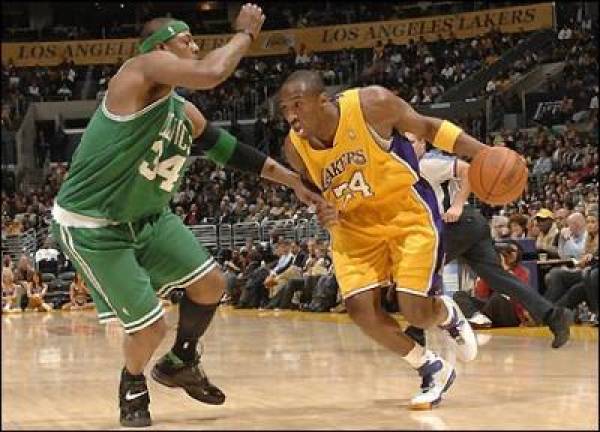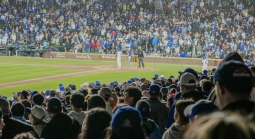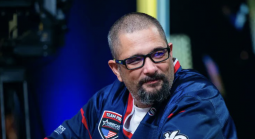Sports Betting News: NBA Relaxes Gambling Stance

The NBA may be taking another step toward relaxing its antigambling stance. The league is talking with the Ontario Lottery and Gaming Corp. about adding the league's games to lottery cards in 8,000 gambling facilities, according to OLG and NBA spokesmen. Ontario says it removed betting on NBA games in 1994 as a condition to the league's having awarded the Raptors franchise to Toronto the year before. In 2008, the league lifted its ban on NBA odds being posted in Las Vegas's Palms Casino, above, which is owned by the Sacramento Kings' Maloof family.
NFL Goes Into Two Minute Drill on Lobbying
The source here is Scripps News John Lindsay
The National Football League's dominance of the American sports landscape is unquestioned. Most stadiums are filled for every game, more than half of the franchises are worth at least $1 billion and the NFL's television viewership dwarfs those of all other leagues. The ratings for the 2009 Super Bowl were higher than the ratings for baseball's World Series, the NBA Finals and hockey's Stanley Cup Finals combined.
So the NFL has little to fear, right? Wrong. Judging from its campaign contributions and lobbying expenditures, the NFL has a lot to worry about, and it wants help from Congress.
From 2007-2009, the NFL paid lobbyists more than $3 million to vie for its interests in Washington, according to the Center for Responsive Politics.
"Like any American business, especially one as popular as professional football, we are respectful of governmental interest and attention," Jeff Miller, the NFL's vice president for government relations and public policy, said in an e-mail. "We believe it is important to work with Congress on issues of mutual relevance. We have done that for decades ...''
But there seems to be increased urgency. The $3.148 million in lobbying the league spent the last three years is $500,000 more than the league spent on lobbying in the previous six years (2001-2006) combined. This goes against the national trend that saw total lobbying expenditures fall 27 percent from $3.3 billion in 2008 to $2.51 billion in 2009.
Miller declined to comment on the specifics of increased lobbying as did representatives of two Washington lobbying firms, Covington & Burling and The Glover Group, which collectively received $740,000 from the league in 2009.
"When you get around that $1 million mark (in lobbying costs for a year), that's not an insignificant figure,'' said Dave Levinthal, a lobbying expert for opensecrets.org, a site that tracks Washington lobbying activities. "It's actually pretty special. Not a whole lot of businesses these days have that kind of money to put into lobbying.''
In addition to its lobbying expenditures, the NFL is making campaign contributions for individual members of Congress. In June 2008, the NFL established the Gridiron-PAC, its own political action committee. NFL owners and insiders gave more than $300,000 to the PAC, including several that contributed the maximum of $5,000 per candidate. The PAC, in turn, has given $63,500 to members of Congress: $26,000 to Democrats in the House of Representatives, $16,500 to Senate Democrats, $15,000 to House Republicans and $6,000 to GOP senators.
Among the items the NFL monitors in Washington are issues related to broadcast rights, a source of billions of dollars in league revenues.
One bill that the NFL has lobbied on is H.R. 2994, the Satellite Home Viewer Reauthorization Act. Passed overwhelmingly by the House in early December, the bill could affect the league's Sunday Ticket package with satellite TV providers. If passed by Congress and signed into law, the bill would ensure the delivery by satellite of distant network signals to homes in rural areas that cannot receive network programming from a local station. The NFL's popular Sunday Ticket package is distributed exclusively by satellite provider DirecTV, and the number of available channels on any particular system is limited. The bill is currently awaiting action by the Senate.
"We have not taken a formal position on the satellite bill, but we closely monitor all legislation that may affect our ability to distribute NFL games to our fans,'' Miller said.
H.R. 2994 was reported favorably by the House Committee on Energy and Commerce. Eight members of that panel -- Democrats Edward Markey of Massachusetts, Bobby Rush of Illinois, Doris Matsui of California, Zachary Space of Ohio, Bart Stupak of Michigan and Charlie Melancon of Louisiana and Republicans Fred Upton of Michigan and Mary Bono Mack of California -- received a total of $19,000 in campaign contributions from the NFL's PAC for the 2010 election cycle.
"With the existence of the NFL Network and its battle to become available on all major cable systems, that's something they're probably looking down the road at,'' said Rick Burton, the Falk professor of sports management at Syracuse University. "And how about the Super Bowl as a pay-per-view event? It's hardly an original idea, but think about it. If they charge even $1, think how much they would make.''
Other issues in Washington of concern for the NFL include:
-- Unrest with the players' union over the basic agreement that expires on March 1, 2011, and has some experts predicting that the owners will lock the players out for the 2011 season. With its NFL-loving constituents likely in an uproar, some experts think Congress could intervene if a new agreement isn't reached.
Preferring to preserve the current system that guarantees them 59 percent of the league's total revenues in salaries and benefits, players have already made their way to Capitol Hill.
"We want Congress to know that management is pushing us toward a lockout," Tennessee Titans center Kevin Mawae told reporters Wednesday. Mawae, president of the NFL players union, was one of 30 current and former players who met with lawmakers in Washington Wednesday.
Countered the NFL's Miller: "We will get a new agreement at some point. The only question is when. We certainly hope there will be no work stoppage and we are going to work as hard as possible to avoid that situation ...''
-- Increased health concerns over player concussions and their long-term effects, which have already drawn congressional hearings.
-- All three teams in California (Oakland, San Francisco and San Diego) are looking for or are in the process of building new stadiums. Los Angeles, without an NFL team since 1995, has also drawn up plans for a new facility in hopes of landing an existing or expansion franchise. Recently, U.S. Sen. Charles Schumer, D-N.Y., sought out reassurance from Buffalo Bills owner Ralph Wilson that he has no intention of relocating the team to Los Angeles.
-- The NFL is forever at war with -- or embracing, depending on whom you believe -- the gambling issue. Unquestionably, betting on games and fantasy football leagues boosts the league's popularity, but league officials are also wary of the doomsday scenario of gamblers fixing games or even a Super Bowl. The league has actively sought to ban betting on games on offshore Internet gambling sites and in state-sanctioned parlay cards.
"The NFL opposes all forms of betting on the outcome of our games,'' Miller said. "... We continue to monitor efforts to expand legal sports betting on the state and federal level and believe it would be bad public policy and unhealthy for our sport.''













